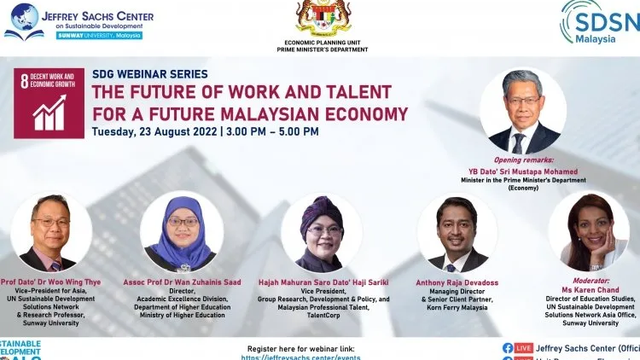SDSN Malaysia Joins Forces with the Economic Planning Unit on a Webinar on the Future of Work and Talent for a Future Malaysian Economy
Since August 2020, the Economic Planning Unit (EPU) Malaysia has collaborated with SDSN Malaysia’s host institution, the Jeffrey Sachs Center on Sustainable Development (JSC), on multiple webinars addressing the SDGs, as part of its “SDG Webinar Series”.
On August 23, 2022, in an effort to reaffirm the Government’s commitment of successfully implementing the 2030 Agenda for Sustainable Development and inspire all Malaysians to support this ambitious endeavor, a webinar was jointly organized to discuss the progress made by Malaysia on SDG 8: Decent Work and Economic Growth.
The webinar saw an audience of 260 people, composed of individuals from the private sector, academia, government, and civil society. The webinar, assembled by an eminent panel, discussed policy responses by the government in the post-pandemic world, initiatives by the private sector, and imperatives in talent development to accelerate full and productive employment.
Opening remarks were given by Yang Berhomat Dato’ Sri Mustapa Mohamed, Minister in the Prime Minister’s Department (Economy), via a prerecorded video where he highlighted that Malaysia’s employment rate fell to 3.8% in June 2022 as compared to the 5.3% increase in May 2020, arguably, the lowest since the country was hit by the COVID-19 pandemic. The Minister also highlighted that the country’s road to economic recovery can be attributed to the opening of Malaysia’s international borders, the government’s proactive measures and initiatives such as the wage subsidy programs, and the establishment of the National Employment Council. The government has channeled close to RM21 billion to roughly 360,000 employers through the wage subsidy program to protect the jobs of over 3 million local workers. In closing, the Minister emphasized the government's focus on attracting and boosting quality private investments to create quality job opportunities in achieving long term sustainable growth and facilitate knowledge intensive productivity driven growth. He also covered Malaysia’s evolving labor market, mentioning that the gig economy is here to stay.
Panelists:
- Prof. Dato' Dr Woo Wing Thye, Vice-President for Asia, United Nations Sustainable Development Solutions Network (SDSN) & Research Professor, Sunway University
- Assoc. Prof Dr Wan Zuhainis Saad, Director, Academic Excellence Division, Department of Higher Education, Ministry of Higher Education Malaysia
- Puan Hajah Mahuran Saro Dato' Haji Sariki, Vice President, Group Research, Development & Policy, and Malaysian Professional Talent, TalentCorp
- Mr. Anthony Raja Devadoss, Managing Director & Senior Client Partner, Korn Ferry Malaysia
Moderator:
- Ms. Karen Chand, Director of Education Studies, SDSN Kuala Lumpur Office, Sunway University
Moderator, Karen set the stage by sharing data and facts such as:
- Youth represents 67% of Malaysia’s total unemployed.
- Youth unemployment is at around 8% and has been persistently higher than overall unemployment in Malaysia at 4.5% and on an upward trend.
- 25% of the Malaysian workforce (4.5 million people) will lose their jobs to automation by 2030.
- By 2025, 50% of workers will need to reskill to keep their jobs.
Prof. Woo , Vice-President for Asia at SDSN, presented on generating dynamic, inclusive, green economic growth for full and productive employment. He discussed graduate salary and made suggestions on the policy agenda, including ASEAN working with multilateral institutions and taking action on climate through decarbonization.
Assoc. Prof Dr Wan from the Ministry of Higher Education began his remarks by sharing insights on the future of the workforce, metaverse virtual space, cloud content and services revenue, global competence and the issues and challenges when addressing the skills mismatch/gap in Malaysia. Next, she discussed the Malaysian Education Blueprint (2015-2025) and the government’s focus on globalized online learning and a digital governance structure including digital talent, digital infrastructure and data, and emerging technologies. In closing, she mentioned experiential learning and competency based education.
Puan Hajah Mahuran , an expert on the future of work, began her presentation by giving an overview of TalentCorp Malaysia, a government agency under the Malaysia Ministry of Human Resources. Next, she shared emerging and declining jobs by the World Economic Forum (WEF), followed by enhancing talent funnel & graduate employability readiness, work-life practices, and insights on flexible work arrangements.
The final speaker, Mr. Anthony Raja Devadoss , shared summary perspectives of Korn Ferry’s latest report called “Future of Work 2022 Trends: The implications for people, leadership, organizations, and culture”.
The webinar concluded with a Q&A among the panelists and a virtual group photo.
The live stream recording of this and past SDG webinars is available on the Jeffrey Sachs Center on Sustainable Development Facebook page.
